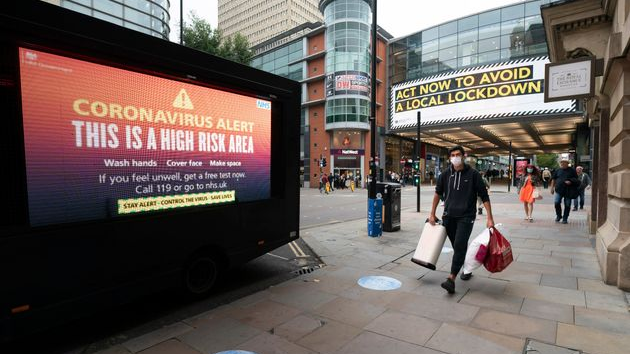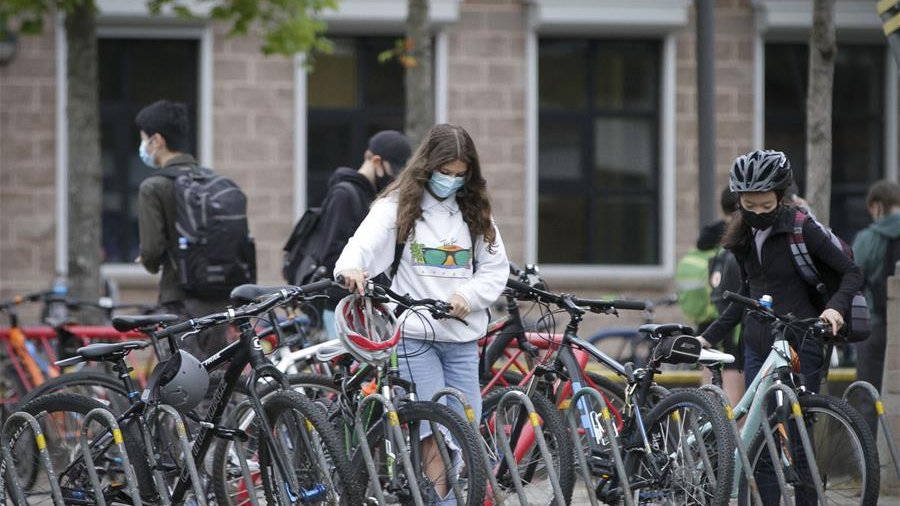
Members of the public are seen by public information messages after British Prime Minister Boris Johnson set out new restrictions to last "perhaps six months" to slow the renewed spread of coronavirus, Manchester, England, September 22, 2020. /AP
Editor's note: Stephen Ndegwa is a Nairobi-based communication expert, lecturer-scholar at the United States International University-Africa, author and international affairs columnist. The article reflects the author's opinions and not necessarily the views of CGTN.
Going by the recent spikes in coronavirus cases in various countries particularly in Europe, it looks like the COVID-19 pandemic will not be over until communities act in unison in fighting the virus.
Undoubtedly, there is an emerging second wave of the pandemic, just when many countries had thought that they had managed to contain its spread by flattening the curve of infections. This has raised an alarm not just in medical circles, but also politically as governments grapple with instituting containment measures that may be anathema to the freedoms hitherto enjoyed by their citizens.
During a press conference in Downing Street on September 21, United Kingdom's chief scientific advisor, Patrick Vallance, warned that the number of coronavirus cases were doubling every seven days, and projected that "by mid-October you would end up with something like 50,000 per day," which "could lead to 200 deaths a day" by November.
Observers have attributed selfishness to this re-emergence and unending crisis. Addressing the same function alongside Vallance, UK's Chief Medical Officer Professor Chris Whitty put it aptly when he stated that those who claim to take their own risk are "unfortunately taking a risk on behalf of everybody else."
The day after that, UK Prime Minister Boris Johnson announced new containment measures against the pandemic, having noted that the country had reached a "perilous turning point" in its fight against the virus. In an unprecedented move, Johnson spelled out new COVID-19 rules that include compulsory wearing of face masks by certain categories of people, steep fines for non-compliance, restrictions on meetings and reinstatement of work-from-home.
The UK is one of the countries that have been forced to face reality and institute measures that it had scorned at just a few months ago. While Western countries dithered, Asian countries like China and South Korea handled the unfolding crisis with the seriousness and urgency.
France, Poland, the Netherlands and Spain are already on the threshold of the dreaded second wave and are planning serious countermeasures to avoid the trauma of the early months.
Instability has once again hit global equity markets, as investors fear the repercussions of a second wave. Tightening restrictions in many European countries has seen a worrying four percent drop in EU Stoxx. Investors everywhere fear a further dwindling of their fortunes as new restrictions loom and the prospects of further stimulus packages hit by falling revenues.
Crude oil prices are also facing another depression due to predictions of drastic demand reductions from business restrictions, as most Asian stocks also hit new lows at the start of the week. The ripple effect will usher in a new round of global recession.

Students wearing face masks are seen at a school in Vancouver, British Columbia, Canada, September 21, 2020. /Xinhua
For the U.S., it has been one long wave as the federal government and states engage in power struggles about who has the last word in instituting measures against the pandemic, and whether they should be instituted at all. By September 22, the U.S. death toll from the pandemic surpassed 200,000 people. Momentum on U.S. economic recovery stalled in July as the two-trillion-dollar stimulus package failed to revive pre-coronavirus growth levels.
The people's unabated and carefree convergence in political rallies, protests and celebrations since the pandemic became a global threat in many Western nations that created conditions and breeding ground for the re-emergence of the pandemic threat.
It does not have to be this way. Experts are of the opinion that the main reason several Western countries are experiencing an upsurge of coronavirus cases has to do with the ingrained culture of individualism. In the U.S., for instance, many Americans have generally revolted against wearing of masks and the avoidance of crowding, citing their First Amendment rights.
The new trend is scary. The world is in this together, for the long haul. What the new wave has revealed is that piecemeal measures will not do. This is something that Johnson is aware of, as reports indicate that the "PM has held talks with devolved governments in a bid to take one UK approach", as opposed to having measures targeting England only.
The subsequent waves of infection could be what will totally devastate the social and economic lives of countries, destroying the remaining resilience. The "everyone for himself" philosophy is a time bomb that could as well annihilate humanity.
In mid-September, the World Health Organization (WHO) warned that Europe must prepare for a high number of COVID-19 casualties in October and November. This is a position that other countries must also be cognizant of, as the world remains exposed to a second wave.
Hans Kluge, director of WHO's European office put it aptly recently when he said, "The end of the pandemic is the moment that we as a community are going to learn how to live with this pandemic, and it depends on us and that's a very positive message."
(If you want to contribute and have specific expertise, please contact us at [email protected].)
 简体中文
简体中文

